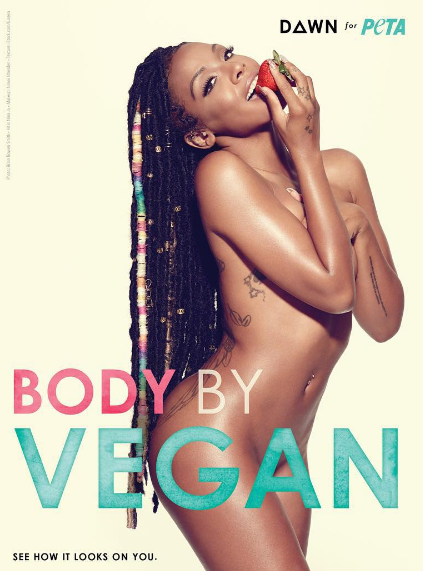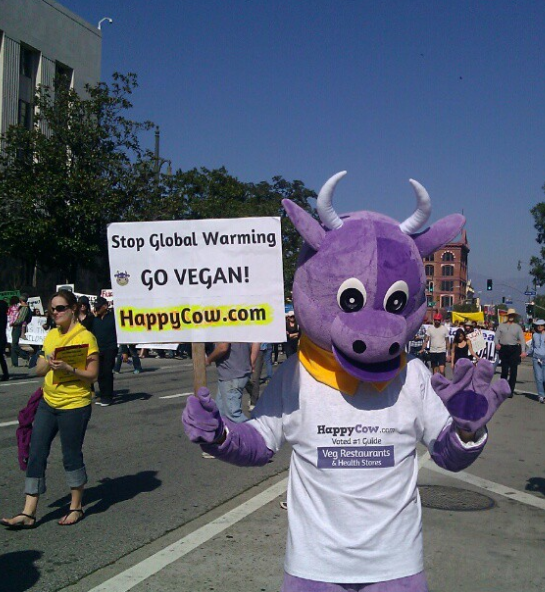One of PETA’s (People for the Ethical Treatment of Animals) main agendas is to encourage people to become vegan, or at the very least, vegetarian. The organization exposes the cruel, inhumane practices of the meat industry through video footage, informational pamphlets, and campaigns. Most of their propaganda uses gory images of butchered or injured animals, hoping that the graphic content will shock people into ditching animal products.
PETA also uses celebrity ambassadors as models in their ad campaigns, often featuring nude or scantily clad stars to sell the idea that a vegan diet will make you as sexy as women like Maggie Q from the show Nikita.
While it’s important to educate people about the food industry, many of the graphic ways the organization promotes veganism are disturbing, and much of the advertising is just borderline pornographic. In fact, in 2010, their Super Bowl ad was banned because it featured underwear-clad women engaging in odd sexual behaviors with vegetables, to sell the idea that “vegetarians have better sex”.
That ban, however, did not cause PETA to drop the whole “better sex” tagline. In 2012, the group released an even more disturbing video in which a woman is wearing a neck brace because her boyfriend went vegan and instantly became better at sex. According to PETA, “better” just means extremely violent.

Photo courtesy of @peta on Instagram
The organization is in no way apologetic for their controversial content. In fact, on their website, the group proudly labels videos such as the Girls Gone Wild spoof, “Milk Gone Wild” as banned, and all of their banned commercials are listed under the website’s viral video section. Plus, the group defends their “controversial tactics” by insisting that it is the only way they have been able to accomplish anything.
Yes, some of the ads make important points about the effects meat and dairy consumption have on the environment, but why do people have to be naked in every ad? The sexualization of women is not justifiable just because it is used for the purpose of saving animals.
Yes, of course people are watching these crude, pornographic videos. But that does not mean people are actually being educated on veganism. When everything is presented in terms of sex and good looks, those are the only takeaways. Viewers are told to equate going vegan with amazing sex and smoking hot bodies, but neither are guarantees.
Does PETA really want people to go vegan for those reasons? If your only goals are to look good and have extremely rough sex, do you really care about animals or the environment? Probably not. Does PETA care? Again, probably not.
It has been reported by many sources that the organization bent on liberating all animals euthanizes thousands of animals that are given to their Norfolk, Virginia facility to be re-homed. This corrupt, hypocritical, extremist group could accomplish so much for animals, yet it seems to have lost sight of its true mission.

Photo courtesy of @peta on Instagram
Instead of shoving horrifying images in our faces and sexualizing women in obscene ways, the organization could simply present the public with straightforward facts. Then, those compassionate enough to take action would likely consider changing their diet for all the right reasons: reducing their carbon footprint, helping themselves to feel better physically, living a more sustainable lifestyle, and of course, reducing the harmful impact they have on the lives of animals.
But of course, like all propaganda, PETA’s campaigns are full of exaggerations, and are always created with the “sex sells” advertising mantra in mind. The resources the organization provides could be helpful, but the important facts are always overshadowed.
Luckily, there are plenty of tasteful resources with no hidden agenda out there that provide information about veganism and reducing your carbon footprint, such as Eat Low Carbon, which lets users take a quiz to determine their carbon “foodprint” score and offers tips on how to lower it, or Happy Cow, which helps visitors find vegan and vegetarian-friendly restaurants in their area and provides guides and recipes.

Photo courtesy of @happycowguide on Instagram
Veganism is not about sex or being society’s close-minded definition of “sexy” (i.e., skinny). It’s about making a lifestyle change because you genuinely care about animals, the earth, and your health, and it should be promoted as such. Pornographic content has no place in the plant-based lifestyle community, and I really wish PETA would recognize that.


